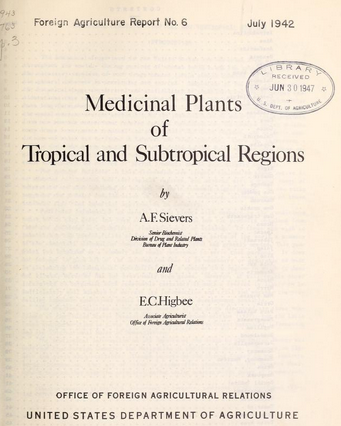Sarsaparilla: an old-fashioned beverage made from the root of a tropical vine.
Sarsaparilla is a climbing plant native to tropical America; Mexico, Honduras, Peru, Ecuador, Costa Rica, and Jamaica are important sarsaparilla-producing countries.
According to Medicinal Plants of Tropical and Subtropical Regions, a book that is found on-line in the Biodiversity Heritage Library at the Internet Archive (Archive.org), the root of the sarsaparilla vine provides flavoring for a soft drink that used to be popular in North America and is still a favored drink in Southeast Asia. It is also a main ingredient, along with sassafras root and other root and plants extracts, for what we know of as root beer. The plant likes heat, moisture, sandy soil, and a relatively hot climate (mean annual temperature of 70-80° F. [21-27° C]), and it grows well staked or on trellises.The mature roots are harvested, cleaned, and sun dried. If smaller roots are left in the ground, they will form new root systems for continued production.
 Medicinal Plants of Tropical and Subtropical Regions, The Biodiversity Heritage Library at the Internet Archive. The book is available for reading on-line.
Medicinal Plants of Tropical and Subtropical Regions, The Biodiversity Heritage Library at the Internet Archive. The book is available for reading on-line.
According to the Raintree Tropical Plant Database, sarsaparilla has been used in traditional and folk medicine as a general tonic and blood purifier. In Europe, sarsaparilla “was a popular European treatment for syphilis when it was introduced from the New World,” and for a period of almost 100 years, from 1820 to 1910, it was “registered in the U.S. Pharmacopoeia as a treatment for syphilis.” [Wikipedia contributors, “Smilax ornata,” Wikipedia, The Free Encyclopedia, http://en.wikipedia.org/w/index.php?title=Smilax_ornata&oldid=633609082 (accessed December 5, 2014)]
In many of the food sections of the municipal and local markets in Mexico, you can still see barrels of “root beer” (cerveza de raíz) from which are dispensed mugfuls of the beverage, along with the other typical drinks of horchata, agua de tamarindo, agua de jamaica, and aguas frescas de frutas.
The statements contained herein have not been evaluated by the Food and Drug Administration. The information contained in this website is intended for informational and entertainment purposes only and is not intended to be used to diagnose, prescribe, or replace proper medical care for which professional medical help should be sought.
